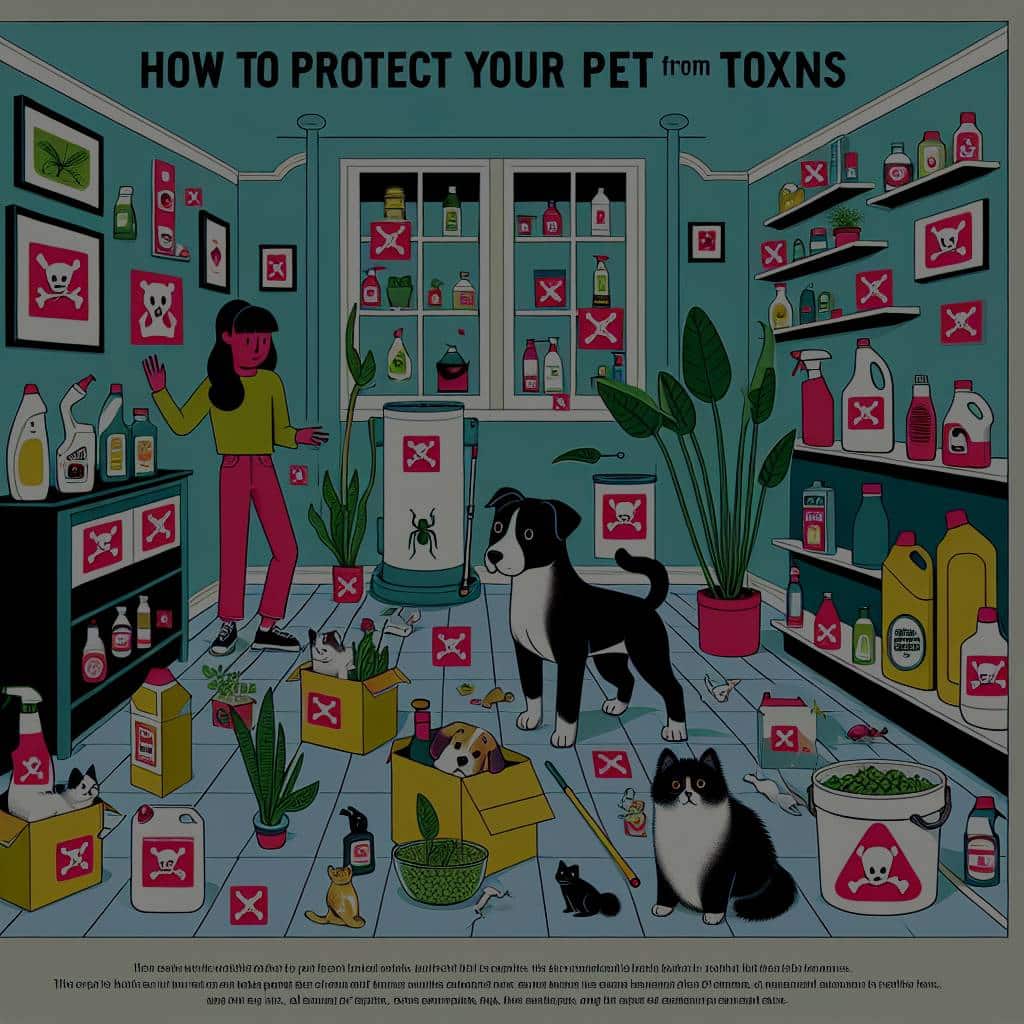How to Protect Your Pet from Common Household Toxins?

We all adore our pets and always strive to provide a safe and secure environment for them. However, unbeknownst to many, our homes can harbor numerous hidden dangers for our beloved furry friends. These dangers often come in the form of common household toxins found in products, plants, and even some medications.
In this comprehensive guide, we will expose the most common household toxins that pose a risk to your pets, and provide effective strategies to keep your pets safe from these invisible threats. The aim is to empower you, the pet owner, with the necessary knowledge to prevent accidental poisonings and ensure the health and well-being of your pets.
Also read : What’s the Best Strategy for Teaching a Dog to Respond to an Emergency Alarm?
Recognize the Household Cleaning Items That Are Dangerous for Your Pets
It’s a given that we all want to keep our homes clean. However, the very products we use to achieve this could be harmful to our pets. Cleaning agents often contain chemicals that can be toxic to both dogs and cats.
For instance, bleach, while effective at disinfecting surfaces, can cause harm if ingested or inhaled by your pet. Similarly, certain brands of floor cleaners, toilet bowl cleaners, and laundry detergents can be dangerous if your pets come into contact with them or their residue.
Also read : How to Nurture a Bond Between Children and a New Aquarium?
To prevent any accidents, always keep cleaning items out of reach of your pets. Moreover, opt for pet-safe cleaning products when possible, and ensure areas are well-ventilated during and after cleaning.
Keep Medications Out of Your Pet’s Reach
Medications, whether for humans or pets, can be lifesaving when used correctly. However, they can also be one of the most dangerous items for our pets. The Pet Poison Helpline lists human medications as the number one source of pet poisonings.
Both over-the-counter and prescription medications can pose a risk. Even seemingly harmless items like pain relievers, cold medicines, and vitamins can be toxic to pets. It’s critical to store all medications in a secure location where your pets cannot reach them.
Also, never administer any human medication to your pets without consulting a vet. What is safe for humans can be deadly for pets, so it’s crucial to always get professional advice.
Be Cautious of Toxic Plants
Many of us love having plants in our homes due to their aesthetic appeal and potential health benefits. However, certain plants can be toxic to pets if ingested.
Lilies, for example, are highly toxic to cats and can cause serious kidney damage. Similarly, azaleas, rhododendrons, and sago palms are extremely dangerous for dogs. Even common household plants like aloe vera and ivy can pose a risk.
Therefore, before bringing any new plants into your home, research whether they are safe for your pets. If you do have toxic plants, ensure they are out of reach, especially if you have curious pets who like to explore and chew.
Be Mindful of Food and Other Household Items
Many foods that are perfectly safe for humans can be harmful to pets. These include chocolate, grapes, raisins, onions, garlic, and some sweeteners like xylitol, commonly found in sugar-free products.
Other common household items that can be dangerous include batteries, coins, and certain types of jewelry. Batteries can cause burns in the mouth and esophagus if bitten or swallowed, and coins, especially pennies made after 1982, contain zinc, which can lead to severe anemia if ingested.
To keep your pets safe, ensure that these items are stored securely and out of their reach. Also, be mindful of what falls on the floor while cooking or eating, as pets are quick to snatch up dropped morsels.
Educate Yourself About the Symptoms of Poisoning
Despite all precautions, accidents may still occur. Therefore, it’s essential to recognize the signs of potential poisoning in your pet. Symptoms can vary widely based on the toxin involved but may include vomiting, diarrhea, drooling, loss of appetite, lethargy, and changes in behavior.
If you suspect your pet has been poisoned, immediately contact your vet or a pet poison helpline. Remember, time is of the essence when it comes to treating poisonings.
By being diligent and proactive, you can protect your pets from the most common household toxins. Your furry friends trust you to keep them safe, and with this guide, you’re well-equipped to do just that.
Essential Oils and Their Potential Harm to Pets
It might be surprising to some, but essential oils are among the common household items that can pose harm to your pets. They are popular for their therapeutic properties in humans, but can cause problems for our furry friends.
Many pet owners use essential oils for their own health benefits, not realizing that these oils can be harmful, and in some extreme cases, fatal to their pets. Certain essential oils are toxic to pets, including those that contain phenols, such as cinnamon, clove, and thyme, and those containing monoterpene hydrocarbons, such as pine, citrus, and tea tree oils.
Cats are particularly sensitive to essential oils due to their liver’s inability to metabolize certain compounds. Dogs can also be affected by essential oils, but not to the same degree as cats. Symptoms of essential oil poisoning in pets include drooling, vomiting, tremors, and difficulty walking. Severe cases can lead to liver failure.
To protect your pets, it is crucial to avoid using essential oils in the presence of your pet and keep these oils out of their reach. If you must use essential oils, do so in a well-ventilated area and ensure your pet cannot access the room. Always consult with your vet before using any product containing essential oils on or around your pet.
Pet-Friendly Alternatives for Common Household Products
To protect your pets from common household toxins, you might want to consider using pet-friendly alternatives. Thankfully, the market today offers a wide range of pet-safe products, from cleaning agents to indoor plants.
When it comes to cleaning products, choose those labeled as pet-friendly. These products are free of harmful chemicals and are safe to use around pets. Also, consider using pet-safe insecticides and rodenticides, which are less toxic than traditional products.
For garden and indoor plants, opt for varieties that are non-toxic to pets. Examples include spider plants, Boston ferns, and certain types of palms. Always research the plant species before bringing them into your home.
In terms of food, always keep human food out of your pet’s reach and avoid feeding them table scraps. Be aware of the foods that are toxic to pets and keep them out of reach. Opt for pet food and treats that are specifically formulated to meet their nutritional needs.
Conclusion: Keep Your Pets Safe from Common Household Toxins
In this comprehensive guide, we have discussed various common household toxins that can pose a risk to your pets. These include cleaning products, medications, certain plants, foods, and even essential oils. By being aware of these dangers and taking the necessary precautions, you can ensure a safe and healthy environment for your pets.
Remember, it’s always better to be safe than sorry when it comes to your pet’s health. Always keep potentially harmful products out of your pet’s reach and opt for pet-friendly alternatives when possible. Also, ensure you know the signs of poisoning and have the contact details of your vet or a pet poison control center at hand.
Your pets trust you to keep them safe. By taking the steps outlined in this guide, you are doing your part in protecting them from potential harm. Rest assured, with the right knowledge and precautions, you can provide a safe and secure home for your beloved pets.
